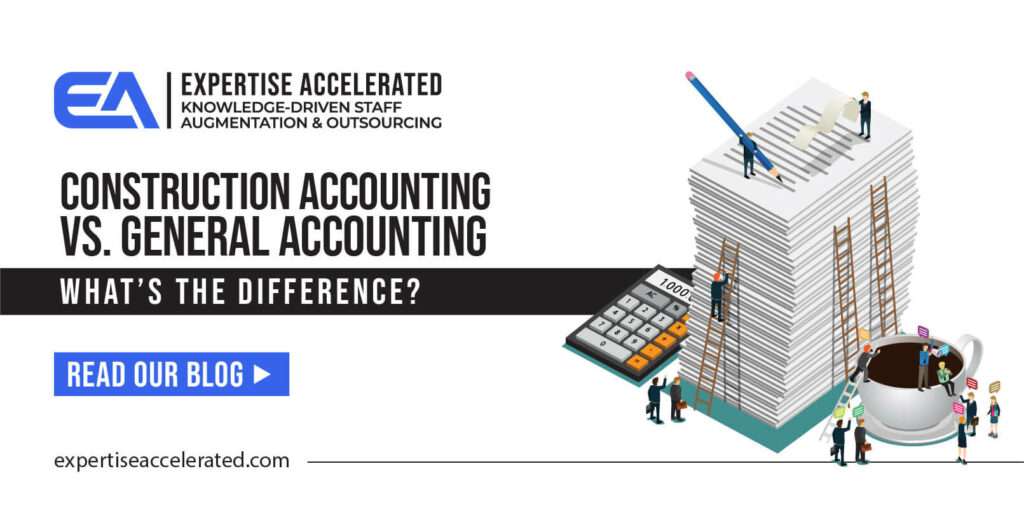Streamline Your Business Finances with Professional Construction Accounting Services
Streamline Your Business Finances with Professional Construction Accounting Services
Blog Article
Recognizing the Relevance of Building Audit for Successful Job Administration

Function of Construction Bookkeeping
Construction audit functions as the foundation of monetary administration in the building industry, making certain that projects are completed within spending plan and financial goals are satisfied. construction accounting. This specialized accountancy approach addresses the distinct difficulties dealt with in building and construction projects, including varying job durations, changing costs, and multiple stakeholders
One of the primary functions of construction audit is to give precise expense estimate and tracking throughout the job lifecycle. This facilitates informed decision-making, making it possible for job supervisors to adjust timelines and sources successfully. Furthermore, construction bookkeeping enhances capital monitoring by checking accounts receivable and payable, hence making certain that funds are readily available for prompt settlements to distributors and subcontractors.
Moreover, building audit help in conformity with market regulations and reporting requirements. It gears up job supervisors with the necessary monetary information to prepare in-depth financial statements, which are vital for audits and monetary evaluations. By keeping clear documents, building and construction accountancy fosters transparency and responsibility, important parts in developing trust amongst stakeholders. Inevitably, the function of construction audit prolongs past plain monetary tracking; it is integral to strategic preparation and operational efficiency, driving the success of construction tasks in a competitive landscape.
Secret Elements of Construction Bookkeeping

Budgeting develops a monetary framework that guides project implementation, allowing supervisors to designate sources efficiently and prepare for possible economic obstacles. Precise cost tracking is important for monitoring expenditures in real-time, assisting to identify variations in between predicted and actual prices. This allows prompt changes to keep the job on budget.
Additionally, monetary reporting offers stakeholders with a clear photo of the job's economic health. Regular records, such as profit and loss declarations and money circulation analyses, promote informed decision-making and enhance openness amongst all events involved.
Additionally, compliance with industry policies and bookkeeping requirements is crucial. This makes certain that economic techniques are not just efficient however also authorized, securing the company versus lawful repercussions. By incorporating these crucial elements, building and construction accountancy cultivates a structured method to managing financial sources, ultimately adding to the successful conclusion of building and construction tasks.
Benefits for Job Managers
Leveraging effective construction audit methods provides job supervisors with a multitude of benefits that boost both functional performance and financial oversight. One substantial benefit is boosted budget monitoring. Accurate tracking of incomes and expenditures enables job managers to keep an eye on monetary performance in genuine time, guaranteeing tasks continue to be within budget and facilitating timely changes when necessary.
In addition, building accountancy improves money flow administration, making it possible for task managers to expect monetary needs and optimize resource allowance. By recognizing cash inflows and outflows, they can much better handle payments to vendors, employees, and subcontractors, thus staying clear of expensive hold-ups.
Additionally, durable accounting systems supply comprehensive coverage capacities. Project supervisors can generate reports that use insights into task profitability, expense view website differences, and resource usage. This data-driven strategy fosters notified decision-making, permitting managers to identify prospective concerns proactively and implement corrective procedures.
Last but not least, adherence to construction bookkeeping criteria makes certain compliance with legal and regulative requirements, minimizing the risk of disagreements or fines. In general, efficient building and construction audit equips project managers with the tools needed to drive task success, boost stakeholder self-confidence, and promote long-term organizational growth.
Usual Difficulties in Building Bookkeeping
Several job managers encounter considerable difficulties in building and construction audit that can hinder project success. One of the primary obstacles is the intricacy of tracking numerous task sites, each with unique spending plans, timelines, and source appropriations. This calls for careful interest to detail, which can be overwhelming without a durable audit system in position.
Furthermore, changing material costs and labor prices can complicate budget management, making exact projecting challenging. Project supervisors commonly battle to resolve these prices with actual expenditures, bring about possible monetary discrepancies.
In addition, building accounting entails compliance with numerous guidelines, including tax obligation responsibilities and labor laws. Browsing these guidelines can be challenging, specifically for managers that may not have a solid accountancy background.
Another substantial challenge is taking care of money circulation, which is vital in the construction market. Hold-ups in invoicing, repayments from customers, or unexpected task changes can develop capital scarcities, endangering the task's progress.
Finally, reliable communication in between task managers, accountants, and area teams is crucial. Misconceptions can result in unreliable economic reporting, additionally making complex project administration initiatives. Addressing these challenges proactively is necessary for effective construction accountancy.

Best Practices for Effective Bookkeeping
While navigating the complexities of building and construction audit can be overwhelming, taking on ideal techniques can dramatically improve monetary administration and project success. One fundamental technique is keeping exact and timely documents. Implementing robust bookkeeping software application customized to construction projects can simplify data entry, invoicing, and coverage, saving and lowering mistakes time.
Furthermore, establishing a clear spending plan and routine monitoring versus this budget plan are important. Employing a system of routine monetary reviews enables project supervisors to determine like this variances early, promoting timely decision-making. It is also necessary to different project prices into indirect and direct groups, allowing more clear insights right into success.
An additional finest technique includes cultivating open communication amongst all stakeholders. Regular updates and collective conversations regarding economic status can make certain everybody is straightened and informed. Educating staff in construction-specific accountancy concepts even more improves competency and accuracy.
Finally, ensuring conformity with appropriate audit standards and laws is non-negotiable. Normal audits and internal testimonials add to transparency and liability, building trust fund with stakeholders and clients. By concentrating on these best techniques, building companies can maximize their accounting processes, eventually driving task success and economic security.
Conclusion
In final thought, building audit plays a crucial role in guaranteeing successful job administration by promoting exact economic oversight and boosting decision-making. By incorporating vital components such as cost estimation, cash flow management, and compliance, project supervisors can browse usual obstacles and utilize ideal techniques for reliable browse this site audit. Ultimately, a robust construction bookkeeping framework not only safeguards spending plan honesty yet additionally adds to the general financial health of construction tasks, cultivating lasting success within the market.
By integrating these key parts, building and construction bookkeeping cultivates a structured strategy to taking care of economic resources, inevitably adding to the effective completion of building and construction jobs.
Exact tracking of expenses and revenues allows task supervisors to keep track of financial efficiency in genuine time, ensuring projects continue to be within budget plan and facilitating prompt modifications when necessary.
Task managers can create reports that offer understandings into task success, price variations, and resource use.Many task managers come across significant obstacles in building audit that can impede task success. construction accounting. Ultimately, a durable construction audit framework not just safeguards budget stability yet also adds to the total monetary wellness of construction jobs, cultivating sustainable success within the market
Report this page